人教版(2019)选择性必修 第四册Unit 3 Sea Exploration Learning About Language 学案 (含答案)
文档属性
| 名称 | 人教版(2019)选择性必修 第四册Unit 3 Sea Exploration Learning About Language 学案 (含答案) | 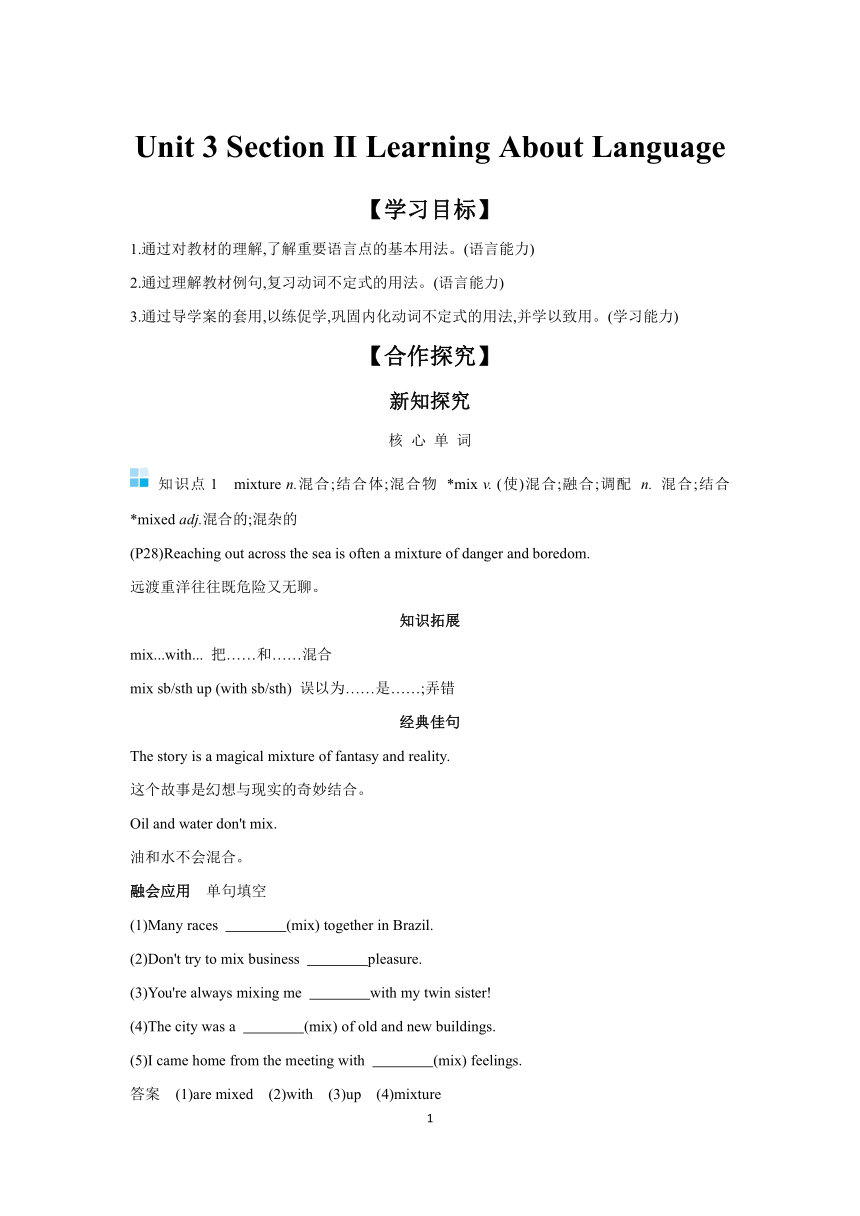 | |
| 格式 | docx | ||
| 文件大小 | 34.5KB | ||
| 资源类型 | 教案 | ||
| 版本资源 | 人教版(2019) | ||
| 科目 | 英语 | ||
| 更新时间 | 2024-04-07 16:44:34 | ||
图片预览

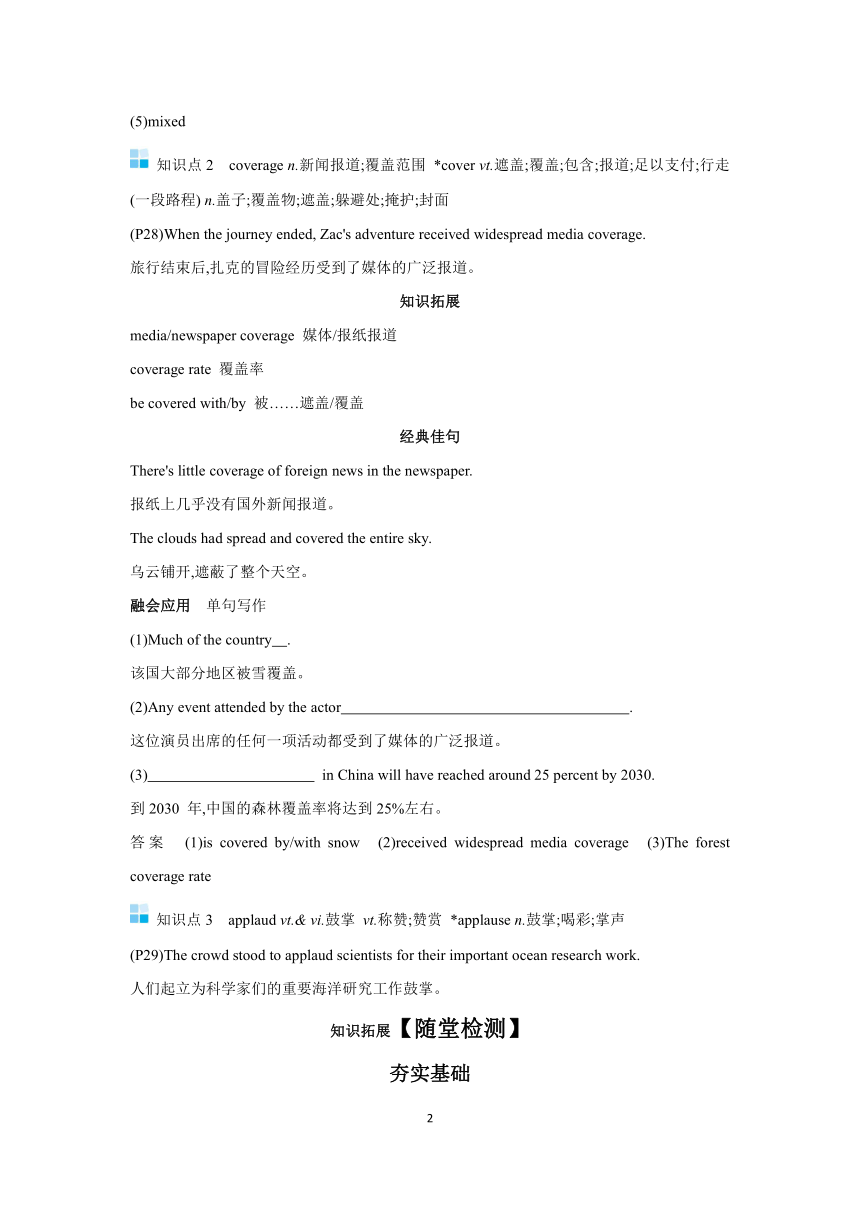
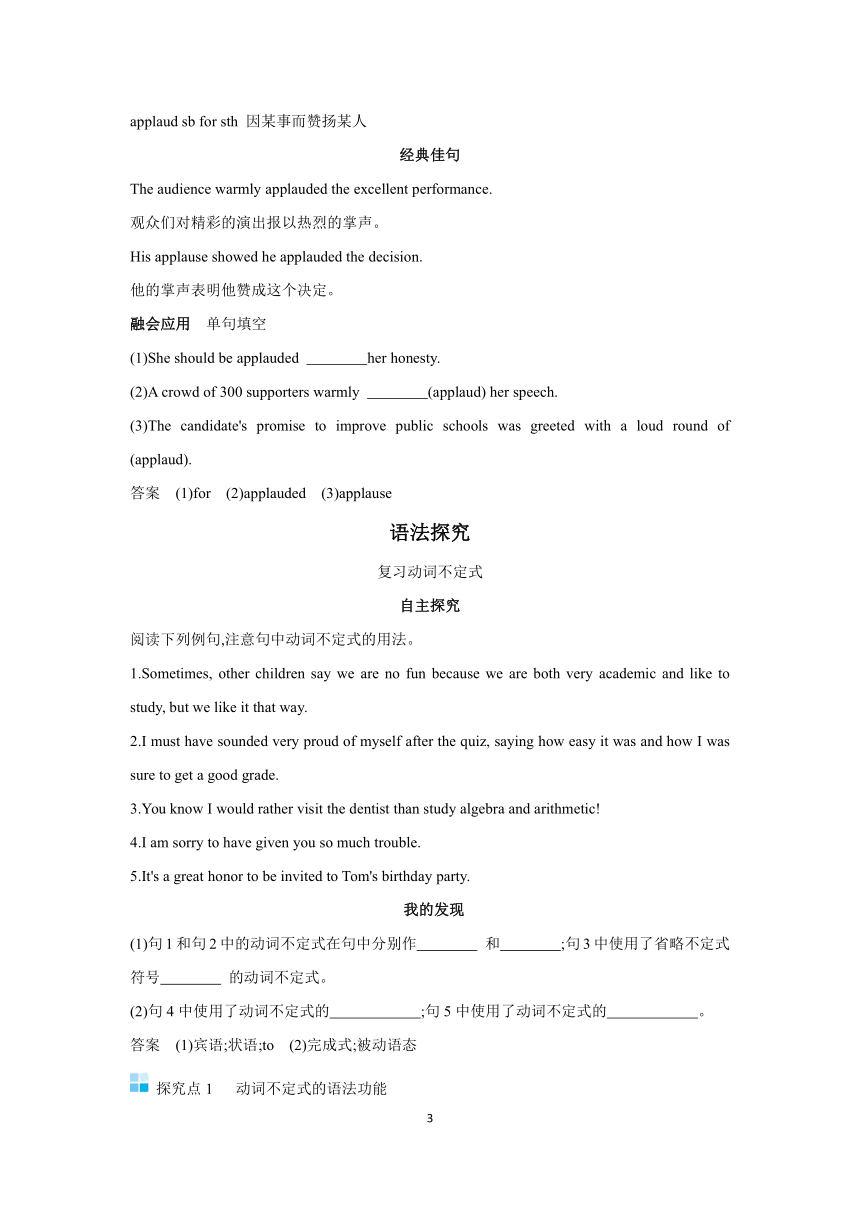
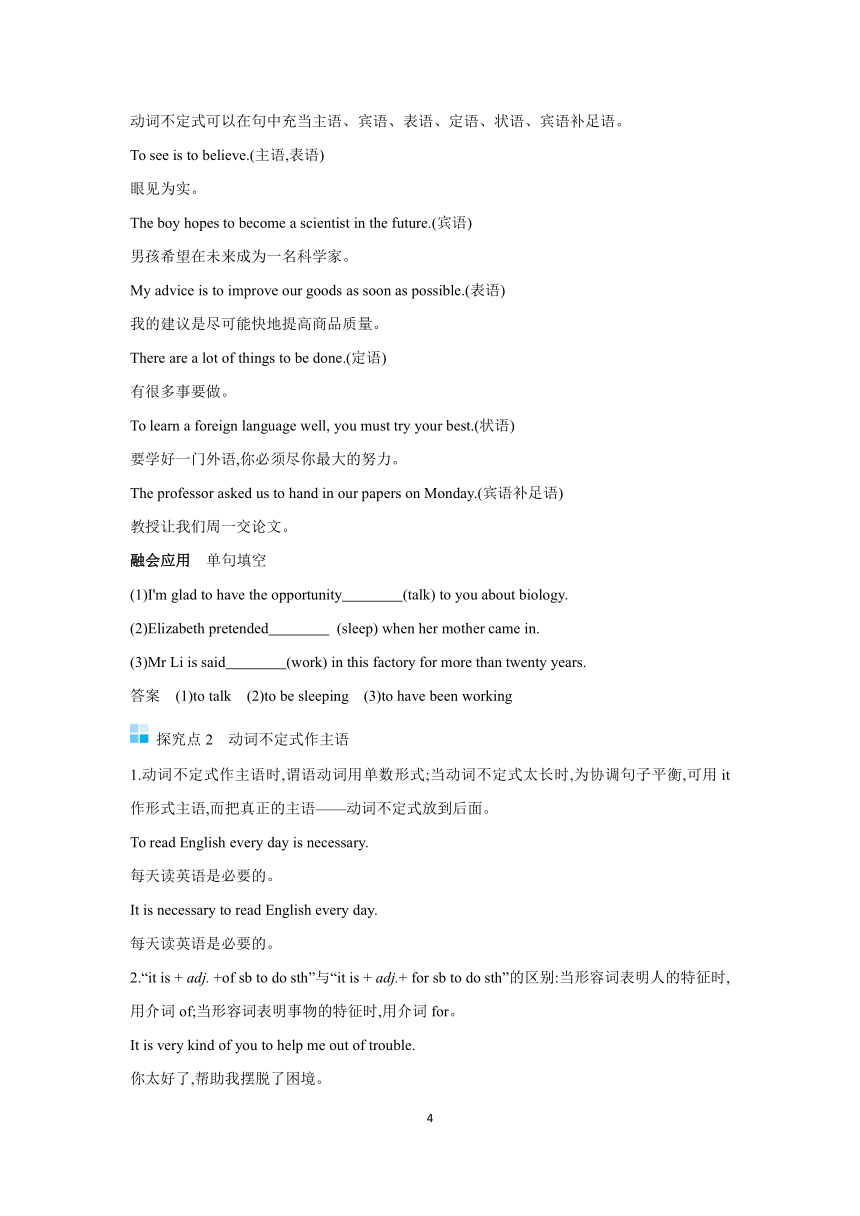
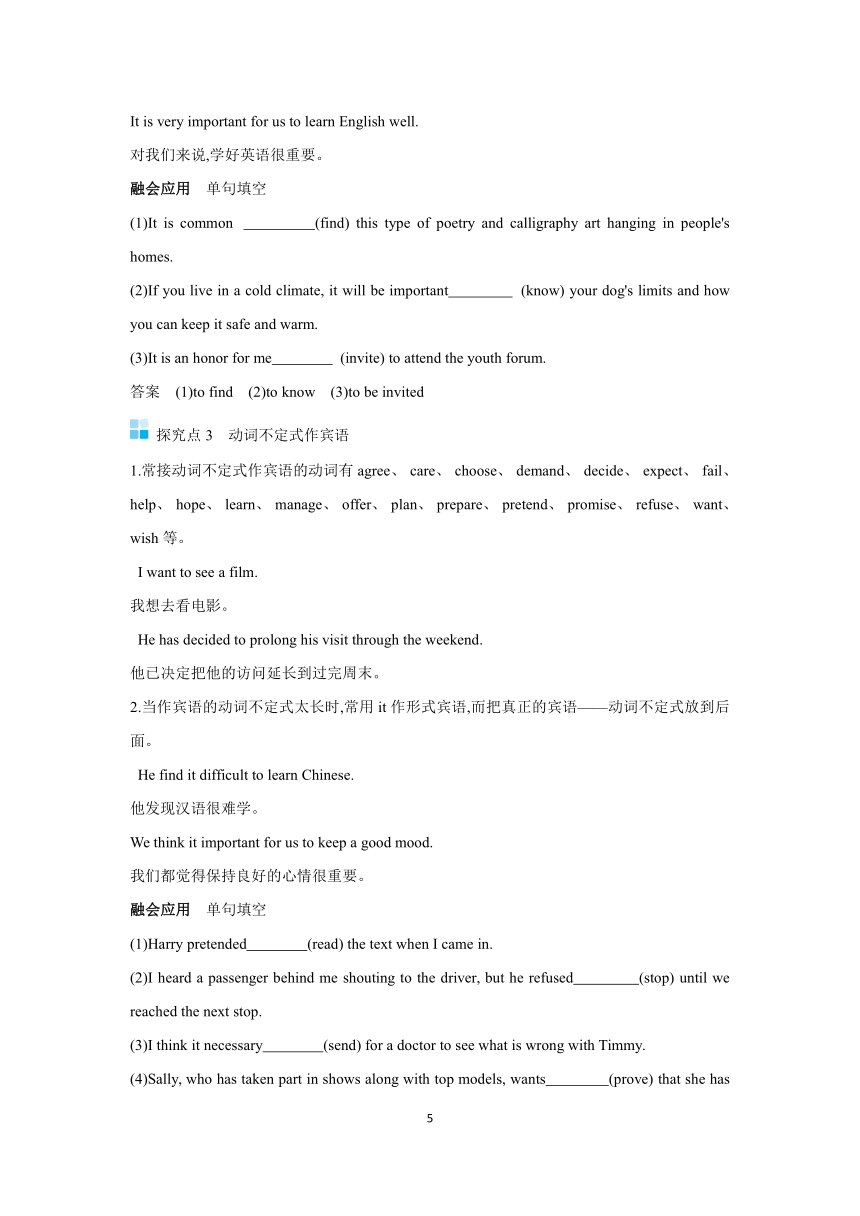
文档简介
Unit 3 Section Ⅱ Learning About Language
【学习目标】
1.通过对教材的理解,了解重要语言点的基本用法。(语言能力)
2.通过理解教材例句,复习动词不定式的用法。(语言能力)
3.通过导学案的套用,以练促学,巩固内化动词不定式的用法,并学以致用。(学习能力)
【合作探究】
新知探究
核 心 单 词
知识点1 mixture n.混合;结合体;混合物 *mix v. (使)混合;融合;调配 n. 混合;结合 *mixed adj.混合的;混杂的
(P28)Reaching out across the sea is often a mixture of danger and boredom.
远渡重洋往往既危险又无聊。
知识拓展
mix...with... 把……和……混合
mix sb/sth up (with sb/sth) 误以为……是……;弄错
经典佳句
The story is a magical mixture of fantasy and reality.
这个故事是幻想与现实的奇妙结合。
Oil and water don't mix.
油和水不会混合。
融会应用 单句填空
(1)Many races (mix) together in Brazil.
(2)Don't try to mix business pleasure.
(3)You're always mixing me with my twin sister!
(4)The city was a (mix) of old and new buildings.
(5)I came home from the meeting with (mix) feelings.
答案 (1)are mixed (2)with (3)up (4)mixture
(5)mixed
知识点2 coverage n.新闻报道;覆盖范围 *cover vt.遮盖;覆盖;包含;报道;足以支付;行走(一段路程) n.盖子;覆盖物;遮盖;躲避处;掩护;封面
(P28)When the journey ended, Zac's adventure received widespread media coverage.
旅行结束后,扎克的冒险经历受到了媒体的广泛报道。
知识拓展
media/newspaper coverage 媒体/报纸报道
coverage rate 覆盖率
be covered with/by 被……遮盖/覆盖
经典佳句
There's little coverage of foreign news in the newspaper.
报纸上几乎没有国外新闻报道。
The clouds had spread and covered the entire sky.
乌云铺开,遮蔽了整个天空。
融会应用 单句写作
(1)Much of the country .
该国大部分地区被雪覆盖。
(2)Any event attended by the actor .
这位演员出席的任何一项活动都受到了媒体的广泛报道。
(3) in China will have reached around 25 percent by 2030.
到2030 年,中国的森林覆盖率将达到25%左右。
答案 (1)is covered by/with snow (2)received widespread media coverage (3)The forest coverage rate
知识点3 applaud vt.& vi.鼓掌 vt.称赞;赞赏 *applause n.鼓掌;喝彩;掌声
(P29)The crowd stood to applaud scientists for their important ocean research work.
人们起立为科学家们的重要海洋研究工作鼓掌。
知识拓展【随堂检测】
夯实基础
applaud sb for sth 因某事而赞扬某人
经典佳句
The audience warmly applauded the excellent performance.
观众们对精彩的演出报以热烈的掌声。
His applause showed he applauded the decision.
他的掌声表明他赞成这个决定。
融会应用 单句填空
(1)She should be applauded her honesty.
(2)A crowd of 300 supporters warmly (applaud) her speech.
(3)The candidate's promise to improve public schools was greeted with a loud round of (applaud).
答案 (1)for (2)applauded (3)applause
语法探究
复习动词不定式
自主探究
阅读下列例句,注意句中动词不定式的用法。
1.Sometimes, other children say we are no fun because we are both very academic and like to study, but we like it that way.
2.I must have sounded very proud of myself after the quiz, saying how easy it was and how I was sure to get a good grade.
3.You know I would rather visit the dentist than study algebra and arithmetic!
4.I am sorry to have given you so much trouble.
5.It's a great honor to be invited to Tom's birthday party.
我的发现
(1)句1和句2中的动词不定式在句中分别作 和 ;句3中使用了省略不定式符号 的动词不定式。
(2)句4中使用了动词不定式的 ;句5中使用了动词不定式的 。
答案 (1)宾语;状语;to (2)完成式;被动语态
探究点1 动词不定式的语法功能
动词不定式可以在句中充当主语、宾语、表语、定语、状语、宾语补足语。
To see is to believe.(主语,表语)
眼见为实。
The boy hopes to become a scientist in the future.(宾语)
男孩希望在未来成为一名科学家。
My advice is to improve our goods as soon as possible.(表语)
我的建议是尽可能快地提高商品质量。
There are a lot of things to be done.(定语)
有很多事要做。
To learn a foreign language well, you must try your best.(状语)
要学好一门外语,你必须尽你最大的努力。
The professor asked us to hand in our papers on Monday.(宾语补足语)
教授让我们周一交论文。
融会应用 单句填空
(1)I'm glad to have the opportunity (talk) to you about biology.
(2)Elizabeth pretended (sleep) when her mother came in.
(3)Mr Li is said (work) in this factory for more than twenty years.
答案 (1)to talk (2)to be sleeping (3)to have been working
探究点2 动词不定式作主语
1.动词不定式作主语时,谓语动词用单数形式;当动词不定式太长时,为协调句子平衡,可用it作形式主语,而把真正的主语——动词不定式放到后面。
To read English every day is necessary.
每天读英语是必要的。
It is necessary to read English every day.
每天读英语是必要的。
2.“it is + adj. +of sb to do sth”与“it is + adj.+ for sb to do sth”的区别:当形容词表明人的特征时,用介词of;当形容词表明事物的特征时,用介词for。
It is very kind of you to help me out of trouble.
你太好了,帮助我摆脱了困境。
It is very important for us to learn English well.
对我们来说,学好英语很重要。
融会应用 单句填空
(1)It is common (find) this type of poetry and calligraphy art hanging in people's homes.
(2)If you live in a cold climate, it will be important (know) your dog's limits and how you can keep it safe and warm.
(3)It is an honor for me (invite) to attend the youth forum.
答案 (1)to find (2)to know (3)to be invited
探究点3 动词不定式作宾语
1.常接动词不定式作宾语的动词有agree、 care、 choose、 demand、 decide、 expect、 fail、 help、 hope、 learn、 manage、 offer、 plan、 prepare、 pretend、 promise、 refuse、 want、 wish等。
I want to see a film.
我想去看电影。
He has decided to prolong his visit through the weekend.
他已决定把他的访问延长到过完周末。
2.当作宾语的动词不定式太长时,常用it作形式宾语,而把真正的宾语——动词不定式放到后面。
He find it difficult to learn Chinese.
他发现汉语很难学。
We think it important for us to keep a good mood.
我们都觉得保持良好的心情很重要。
融会应用 单句填空
(1)Harry pretended (read) the text when I came in.
(2)I heard a passenger behind me shouting to the driver, but he refused (stop) until we reached the next stop.
(3)I think it necessary (send) for a doctor to see what is wrong with Timmy.
(4)Sally, who has taken part in shows along with top models, wants (prove) that she has brain as well as beauty.
答案 (1)to be reading (2)to stop (3)to send (4)to prove
探究点4 动词不定式作表语
1.动词不定式作表语时,它的主要功能是说明主语的性质、特点或属性。常见的用法有以下几种:
(1)表示行为或状态的性质、特点或属性。
Her goal is to learn English well.
她的目标是学好英语。
The key to success is to work hard.
成功的关键是努力工作。
(2)表示某种职业或角色的属性。
His dream is to become a famous writer.
他的梦想是成为一位著名的作家。
My ambition is to be a doctor.
我的抱负是成为一名医生。
(3)表示某种意愿、决心或计划。
His plan is to travel to Europe next year.
他的计划是明年去欧洲旅行。
My intention is to study abroad in the future.
我的打算是将来去国外留学。
(4)表示某种可能性或假设。
The problem seems to be difficult to solve.
这个问题似乎很难解决。
The situation is likely to get worse.
形势可能会变得更加严峻。
2.常接动词不定式作表语的连系动词(短语)有seem、 appear、 prove、 grow、 turn out等。
He appears to know this.
他好像知道这一点。
His forecast turned out to be quite wrong.
他的预测最后证明是大错特错。
融会应用 单句填空
(1)It is important to remember when you're trying to get along with people who are very difficult or seem (ignore) you, everyone is just doing the best that they can.
(2)He is children's books editor, whose job is (sort) through thousands of new titles published each year and select the very best ones in the Times.
(3)The goal of this activity is (meet) the needs of common people.
答案 (1) to be ignoring (2)to sort (3)to meet
探究点5 动词不定式作宾语补足语
1.动词不定式可以在“主语+谓语+宾语+宾语补足语”句型中充当宾语补足语,常见的这类动词有ask、 want、 invite、 get、 force、 expect、 allow、 persuade、 order、 warn、 remind、 cause、 permit、 advise、 teach等。
Father will not allow us to play in the street.
父亲不会允许我们在街上玩耍。
2.有些动词(短语)接省略to的动词不定式作宾语补足语,表示动作的全过程,如:一感 (feel), 二听(hear、 listen to), 三使(let、 have、 make), 五看 (see、 notice、 observe、 watch、 look at), 半帮助 (help)。 动词不定式作help的宾语补足语时,既可带to, 也可不带to。 当这些词所在句子改为被动句时, 动词不定式符号to必须保留。
Nobody saw him come in. (主动语态)
没人看见他进来。
The thief was observed to enter the bank. (被动语态)
有人看见小偷进了银行。
融会应用 单句填空
(1)What caused him (change) his mind
(2)He didn't allow the students (go) there.
(3)The teacher got some students (stay) in the classroom after school.
(4)Henry was made (work) day and night.
答案 (1) to change (2)to go (3)to stay (4)to work
探究点6 动词不定式作定语
1.动词不定式作定语表示将来的动作。
I wanted to come to your birthday party, but I had a project to finish then.
我想来参加你的生日派对,但那时我有一个项目要完成。
2.动词不定式常放在某些名词或代词后作定语。
当不定式中的动词为不及物动词或与所修饰的名词或代词构成动宾关系时,动词不定式后需要加相应的介词。
I need a pen to write with.
我需要一支钢笔写字。
如果被动词不定式修饰的名词为place、 time、 way等, 动词不定式后的介词习惯上可以省去。
It's a nice place to live (in).
这是一个适合居住的好地方。
3.动词不定式用来修饰序数词、最高级或被no、 all、 any等限定的中心词,且与中心词存在逻辑上的主谓关系。
He is always the first to arrive at the school and the last to leave the school.
他总是第一个到校, 最后一个离校。
4.被修饰词是抽象名词时,常用动词不定式作定语。常见的该类名词有ability、 chance、 idea、 hope、 wish、 fact、 excuse、 promise、 attempt、 way等。
The ability to express an idea is as important as the idea itself.
表达观点的能力与观点本身同等重要。
5.动词不定式作定语时, 若句子主语是动词不定式动作的执行者, 则用主动形式表被动含义; 若句子主语不是动词不定式动作的执行者, 则用被动形式表被动含义。
She has a sister to look after.
她有一个妹妹要照顾。
He was the second man to be killed this way.
他是第二个这样被杀害的人。
融会应用 单句填空
(1)The best way (set) yourself up for success is to make sure that your goals are SMART: specific, measurable, attainable, relevant, and timely.
(2)We're having a meeting in an hour and the decision (make) at the meeting will influence the future of our company.
(3)Are you going to attend their wedding (hold) next month
答案 (1)to set (2) to be made (3)to be held
探究点7 动词不定式作状语
1.动词不定式作目的状语,表示“为了”,可以单独放在句首、句中或句末。如果强调目的,动词不定式前常常加in order或so as, 但so as to不能置于句首。
To/In order to increase levels of community service, some schools have launched compulsory volunteer programs.
为了提高社区服务水平, 一些学校已经发起了义务志愿者服务计划。
2.动词不定式作结果状语,常表示令人意外的结果, 有时在其前加only, 以加强语气。动词不定式作结果状语时,常与副词too或enough连用,常见的结构有:
enough to do 足够做……
too... to do... 太……而不能……
so/such... as to... 如此……以至于……
Tom took a taxi to the airport, only to find his plane high up in the sky.
汤姆乘出租车去了机场, 结果发现他要乘坐的飞机已飞入高空。
He is old enough to go to school.
他到上学的年龄了。
3.表示喜、怒、哀、乐等的形容词作表语时,后可接动词不定式作原因状语,用以说明产生这种心理活动或情绪的原因。常用于这类结构的形容词有sorry、 surprised、 disappointed、 excited、 glad、 happy、 anxious、 delighted、 pleased、 foolish等。
Maggie was glad to be home in her own bed.
玛吉回到家躺在自己的床上, 觉得非常高兴。
I'm delighted to hear that you are keen on Chinese traditional culture.
我很高兴听到你喜欢中国传统文化。
融会应用 单句填空
(1) (liberate) our country, they devoted their lives.
(2) (learn) more about Chinese culture, Jack has decided to take Chinese folk music as an elective course.
(3)The lady rushed home immediately only (find) that her husband was gone.
(4)You will never know how happy I was (see) my English teacher yesterday.
答案 (1)To liberate (2) To learn (3)to find (4)to see
探究点8 动词不定式的各种语态和时态
形式 语态 时态
to do 主动 尚未发生
to be done 被动 尚未发生
to be doing 主动 正在进行/与谓语同时进行
to have done 主动 先于谓语动词发生/已发生
to have been done 被动 先于谓语动词发生/已发生
to have been doing 主动 先于谓语动词发生/已发生且动作仍在持续
Personally, I feel happy to have made some good friends.
在我看来,交到一些好朋友真开心。
They seem to be reading in the library now.
他们现在好像在图书馆看书。
It seems to rain soon.
天看起来快要下雨了。
I am honored to have been invited here to give a speech to you.
我很荣幸受邀来这里给你们演讲。
融会应用 单句填空
(1)He was said (teach) in high school since last year.
(2)He wanted the letter (type) at once.
答案 (1)to have been teaching (2)to be typed
2
【学习目标】
1.通过对教材的理解,了解重要语言点的基本用法。(语言能力)
2.通过理解教材例句,复习动词不定式的用法。(语言能力)
3.通过导学案的套用,以练促学,巩固内化动词不定式的用法,并学以致用。(学习能力)
【合作探究】
新知探究
核 心 单 词
知识点1 mixture n.混合;结合体;混合物 *mix v. (使)混合;融合;调配 n. 混合;结合 *mixed adj.混合的;混杂的
(P28)Reaching out across the sea is often a mixture of danger and boredom.
远渡重洋往往既危险又无聊。
知识拓展
mix...with... 把……和……混合
mix sb/sth up (with sb/sth) 误以为……是……;弄错
经典佳句
The story is a magical mixture of fantasy and reality.
这个故事是幻想与现实的奇妙结合。
Oil and water don't mix.
油和水不会混合。
融会应用 单句填空
(1)Many races (mix) together in Brazil.
(2)Don't try to mix business pleasure.
(3)You're always mixing me with my twin sister!
(4)The city was a (mix) of old and new buildings.
(5)I came home from the meeting with (mix) feelings.
答案 (1)are mixed (2)with (3)up (4)mixture
(5)mixed
知识点2 coverage n.新闻报道;覆盖范围 *cover vt.遮盖;覆盖;包含;报道;足以支付;行走(一段路程) n.盖子;覆盖物;遮盖;躲避处;掩护;封面
(P28)When the journey ended, Zac's adventure received widespread media coverage.
旅行结束后,扎克的冒险经历受到了媒体的广泛报道。
知识拓展
media/newspaper coverage 媒体/报纸报道
coverage rate 覆盖率
be covered with/by 被……遮盖/覆盖
经典佳句
There's little coverage of foreign news in the newspaper.
报纸上几乎没有国外新闻报道。
The clouds had spread and covered the entire sky.
乌云铺开,遮蔽了整个天空。
融会应用 单句写作
(1)Much of the country .
该国大部分地区被雪覆盖。
(2)Any event attended by the actor .
这位演员出席的任何一项活动都受到了媒体的广泛报道。
(3) in China will have reached around 25 percent by 2030.
到2030 年,中国的森林覆盖率将达到25%左右。
答案 (1)is covered by/with snow (2)received widespread media coverage (3)The forest coverage rate
知识点3 applaud vt.& vi.鼓掌 vt.称赞;赞赏 *applause n.鼓掌;喝彩;掌声
(P29)The crowd stood to applaud scientists for their important ocean research work.
人们起立为科学家们的重要海洋研究工作鼓掌。
知识拓展【随堂检测】
夯实基础
applaud sb for sth 因某事而赞扬某人
经典佳句
The audience warmly applauded the excellent performance.
观众们对精彩的演出报以热烈的掌声。
His applause showed he applauded the decision.
他的掌声表明他赞成这个决定。
融会应用 单句填空
(1)She should be applauded her honesty.
(2)A crowd of 300 supporters warmly (applaud) her speech.
(3)The candidate's promise to improve public schools was greeted with a loud round of (applaud).
答案 (1)for (2)applauded (3)applause
语法探究
复习动词不定式
自主探究
阅读下列例句,注意句中动词不定式的用法。
1.Sometimes, other children say we are no fun because we are both very academic and like to study, but we like it that way.
2.I must have sounded very proud of myself after the quiz, saying how easy it was and how I was sure to get a good grade.
3.You know I would rather visit the dentist than study algebra and arithmetic!
4.I am sorry to have given you so much trouble.
5.It's a great honor to be invited to Tom's birthday party.
我的发现
(1)句1和句2中的动词不定式在句中分别作 和 ;句3中使用了省略不定式符号 的动词不定式。
(2)句4中使用了动词不定式的 ;句5中使用了动词不定式的 。
答案 (1)宾语;状语;to (2)完成式;被动语态
探究点1 动词不定式的语法功能
动词不定式可以在句中充当主语、宾语、表语、定语、状语、宾语补足语。
To see is to believe.(主语,表语)
眼见为实。
The boy hopes to become a scientist in the future.(宾语)
男孩希望在未来成为一名科学家。
My advice is to improve our goods as soon as possible.(表语)
我的建议是尽可能快地提高商品质量。
There are a lot of things to be done.(定语)
有很多事要做。
To learn a foreign language well, you must try your best.(状语)
要学好一门外语,你必须尽你最大的努力。
The professor asked us to hand in our papers on Monday.(宾语补足语)
教授让我们周一交论文。
融会应用 单句填空
(1)I'm glad to have the opportunity (talk) to you about biology.
(2)Elizabeth pretended (sleep) when her mother came in.
(3)Mr Li is said (work) in this factory for more than twenty years.
答案 (1)to talk (2)to be sleeping (3)to have been working
探究点2 动词不定式作主语
1.动词不定式作主语时,谓语动词用单数形式;当动词不定式太长时,为协调句子平衡,可用it作形式主语,而把真正的主语——动词不定式放到后面。
To read English every day is necessary.
每天读英语是必要的。
It is necessary to read English every day.
每天读英语是必要的。
2.“it is + adj. +of sb to do sth”与“it is + adj.+ for sb to do sth”的区别:当形容词表明人的特征时,用介词of;当形容词表明事物的特征时,用介词for。
It is very kind of you to help me out of trouble.
你太好了,帮助我摆脱了困境。
It is very important for us to learn English well.
对我们来说,学好英语很重要。
融会应用 单句填空
(1)It is common (find) this type of poetry and calligraphy art hanging in people's homes.
(2)If you live in a cold climate, it will be important (know) your dog's limits and how you can keep it safe and warm.
(3)It is an honor for me (invite) to attend the youth forum.
答案 (1)to find (2)to know (3)to be invited
探究点3 动词不定式作宾语
1.常接动词不定式作宾语的动词有agree、 care、 choose、 demand、 decide、 expect、 fail、 help、 hope、 learn、 manage、 offer、 plan、 prepare、 pretend、 promise、 refuse、 want、 wish等。
I want to see a film.
我想去看电影。
He has decided to prolong his visit through the weekend.
他已决定把他的访问延长到过完周末。
2.当作宾语的动词不定式太长时,常用it作形式宾语,而把真正的宾语——动词不定式放到后面。
He find it difficult to learn Chinese.
他发现汉语很难学。
We think it important for us to keep a good mood.
我们都觉得保持良好的心情很重要。
融会应用 单句填空
(1)Harry pretended (read) the text when I came in.
(2)I heard a passenger behind me shouting to the driver, but he refused (stop) until we reached the next stop.
(3)I think it necessary (send) for a doctor to see what is wrong with Timmy.
(4)Sally, who has taken part in shows along with top models, wants (prove) that she has brain as well as beauty.
答案 (1)to be reading (2)to stop (3)to send (4)to prove
探究点4 动词不定式作表语
1.动词不定式作表语时,它的主要功能是说明主语的性质、特点或属性。常见的用法有以下几种:
(1)表示行为或状态的性质、特点或属性。
Her goal is to learn English well.
她的目标是学好英语。
The key to success is to work hard.
成功的关键是努力工作。
(2)表示某种职业或角色的属性。
His dream is to become a famous writer.
他的梦想是成为一位著名的作家。
My ambition is to be a doctor.
我的抱负是成为一名医生。
(3)表示某种意愿、决心或计划。
His plan is to travel to Europe next year.
他的计划是明年去欧洲旅行。
My intention is to study abroad in the future.
我的打算是将来去国外留学。
(4)表示某种可能性或假设。
The problem seems to be difficult to solve.
这个问题似乎很难解决。
The situation is likely to get worse.
形势可能会变得更加严峻。
2.常接动词不定式作表语的连系动词(短语)有seem、 appear、 prove、 grow、 turn out等。
He appears to know this.
他好像知道这一点。
His forecast turned out to be quite wrong.
他的预测最后证明是大错特错。
融会应用 单句填空
(1)It is important to remember when you're trying to get along with people who are very difficult or seem (ignore) you, everyone is just doing the best that they can.
(2)He is children's books editor, whose job is (sort) through thousands of new titles published each year and select the very best ones in the Times.
(3)The goal of this activity is (meet) the needs of common people.
答案 (1) to be ignoring (2)to sort (3)to meet
探究点5 动词不定式作宾语补足语
1.动词不定式可以在“主语+谓语+宾语+宾语补足语”句型中充当宾语补足语,常见的这类动词有ask、 want、 invite、 get、 force、 expect、 allow、 persuade、 order、 warn、 remind、 cause、 permit、 advise、 teach等。
Father will not allow us to play in the street.
父亲不会允许我们在街上玩耍。
2.有些动词(短语)接省略to的动词不定式作宾语补足语,表示动作的全过程,如:一感 (feel), 二听(hear、 listen to), 三使(let、 have、 make), 五看 (see、 notice、 observe、 watch、 look at), 半帮助 (help)。 动词不定式作help的宾语补足语时,既可带to, 也可不带to。 当这些词所在句子改为被动句时, 动词不定式符号to必须保留。
Nobody saw him come in. (主动语态)
没人看见他进来。
The thief was observed to enter the bank. (被动语态)
有人看见小偷进了银行。
融会应用 单句填空
(1)What caused him (change) his mind
(2)He didn't allow the students (go) there.
(3)The teacher got some students (stay) in the classroom after school.
(4)Henry was made (work) day and night.
答案 (1) to change (2)to go (3)to stay (4)to work
探究点6 动词不定式作定语
1.动词不定式作定语表示将来的动作。
I wanted to come to your birthday party, but I had a project to finish then.
我想来参加你的生日派对,但那时我有一个项目要完成。
2.动词不定式常放在某些名词或代词后作定语。
当不定式中的动词为不及物动词或与所修饰的名词或代词构成动宾关系时,动词不定式后需要加相应的介词。
I need a pen to write with.
我需要一支钢笔写字。
如果被动词不定式修饰的名词为place、 time、 way等, 动词不定式后的介词习惯上可以省去。
It's a nice place to live (in).
这是一个适合居住的好地方。
3.动词不定式用来修饰序数词、最高级或被no、 all、 any等限定的中心词,且与中心词存在逻辑上的主谓关系。
He is always the first to arrive at the school and the last to leave the school.
他总是第一个到校, 最后一个离校。
4.被修饰词是抽象名词时,常用动词不定式作定语。常见的该类名词有ability、 chance、 idea、 hope、 wish、 fact、 excuse、 promise、 attempt、 way等。
The ability to express an idea is as important as the idea itself.
表达观点的能力与观点本身同等重要。
5.动词不定式作定语时, 若句子主语是动词不定式动作的执行者, 则用主动形式表被动含义; 若句子主语不是动词不定式动作的执行者, 则用被动形式表被动含义。
She has a sister to look after.
她有一个妹妹要照顾。
He was the second man to be killed this way.
他是第二个这样被杀害的人。
融会应用 单句填空
(1)The best way (set) yourself up for success is to make sure that your goals are SMART: specific, measurable, attainable, relevant, and timely.
(2)We're having a meeting in an hour and the decision (make) at the meeting will influence the future of our company.
(3)Are you going to attend their wedding (hold) next month
答案 (1)to set (2) to be made (3)to be held
探究点7 动词不定式作状语
1.动词不定式作目的状语,表示“为了”,可以单独放在句首、句中或句末。如果强调目的,动词不定式前常常加in order或so as, 但so as to不能置于句首。
To/In order to increase levels of community service, some schools have launched compulsory volunteer programs.
为了提高社区服务水平, 一些学校已经发起了义务志愿者服务计划。
2.动词不定式作结果状语,常表示令人意外的结果, 有时在其前加only, 以加强语气。动词不定式作结果状语时,常与副词too或enough连用,常见的结构有:
enough to do 足够做……
too... to do... 太……而不能……
so/such... as to... 如此……以至于……
Tom took a taxi to the airport, only to find his plane high up in the sky.
汤姆乘出租车去了机场, 结果发现他要乘坐的飞机已飞入高空。
He is old enough to go to school.
他到上学的年龄了。
3.表示喜、怒、哀、乐等的形容词作表语时,后可接动词不定式作原因状语,用以说明产生这种心理活动或情绪的原因。常用于这类结构的形容词有sorry、 surprised、 disappointed、 excited、 glad、 happy、 anxious、 delighted、 pleased、 foolish等。
Maggie was glad to be home in her own bed.
玛吉回到家躺在自己的床上, 觉得非常高兴。
I'm delighted to hear that you are keen on Chinese traditional culture.
我很高兴听到你喜欢中国传统文化。
融会应用 单句填空
(1) (liberate) our country, they devoted their lives.
(2) (learn) more about Chinese culture, Jack has decided to take Chinese folk music as an elective course.
(3)The lady rushed home immediately only (find) that her husband was gone.
(4)You will never know how happy I was (see) my English teacher yesterday.
答案 (1)To liberate (2) To learn (3)to find (4)to see
探究点8 动词不定式的各种语态和时态
形式 语态 时态
to do 主动 尚未发生
to be done 被动 尚未发生
to be doing 主动 正在进行/与谓语同时进行
to have done 主动 先于谓语动词发生/已发生
to have been done 被动 先于谓语动词发生/已发生
to have been doing 主动 先于谓语动词发生/已发生且动作仍在持续
Personally, I feel happy to have made some good friends.
在我看来,交到一些好朋友真开心。
They seem to be reading in the library now.
他们现在好像在图书馆看书。
It seems to rain soon.
天看起来快要下雨了。
I am honored to have been invited here to give a speech to you.
我很荣幸受邀来这里给你们演讲。
融会应用 单句填空
(1)He was said (teach) in high school since last year.
(2)He wanted the letter (type) at once.
答案 (1)to have been teaching (2)to be typed
2
